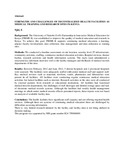Strengths And Challenges Of Decentralized Health Facilities As Medical Training And Research Sites In Kenya
Abstract
Background: The University of Nairobi (UoN) Partnership in Innovative Medical
Education for Kenya (PRIME-K) was established to improve the quality of medical
education and research in Kenya. To achieve this goal, PRIME-K supports continuing
medical education, e-learning, adjunct faculty development, data collection, data
management and data utilization at training sites.
Methods: We conducted a baseline assessment on site location, security level, IT
infrastructure, community activities, staffing, continuous medical education activities,
hospital services, disease burden, research activities and health information systems.
The study team administered a structured key informant interview tool to the facility
managers and the heads of medical records departments of the sites.
Results: Between February 2012 and June 2012, 5 district hospitals and 2 provincial
hospitals were assessed. The facilities were adequately staffed with senior medical
staff and support staff. Key medical services such as maternal, newborn, wards,
pharmacies and laboratories were present in all facilities. All facilities were conducting
regular continuous medical education activities but lacked facilities such as internet.
Research activities at the sites were all conducted by external partners from research or
educational institutions. All facilities had functional medical records departments, but
challenges of staff shortages and limited storage space and lack of electronic medical
records systems. Although the facilities had weekly health management meetings in
which senior medical records officers presented reports, these reports were not based
on analysis of available facility data.
Conclusions: The health facilities have significant staff capacity and are offering
required health services. Although there are systems of continuing medical education
these are challenged by difficulties accessing information.
There is very limited research initiated by the facility and facility data is not
being utilized in decision making.
This program was supported by NIH grant number R24 TW008889
Citation
Njiri,F.;June,2013.Strengths And Challenges Of Decentralized Health Facilities As Medical Training And Research Sites In Kenya,presented at the 2nd International Scientific Conference, CHS And KNH, 19th - 21st June 2013.Publisher
University of Nairobi
Description
Strengths And Challenges Of Decentralized Health Facilities As Medical Training And Research Sites In Kenya,presented at the 2nd International Scientific Conference, CHS And KNH, 19th - 21st June 2013.

